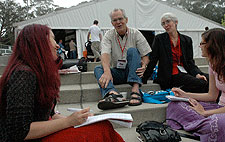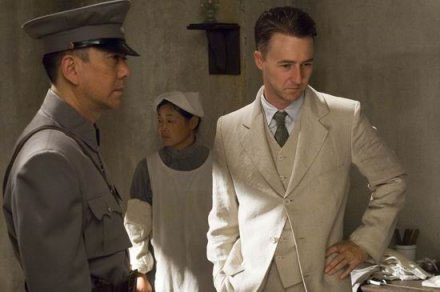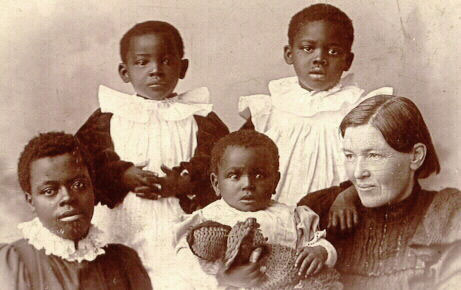Oct
3
2009
Sometimes the Costly Choice is to Stay
by Peter Scholl
I’ve just spent a week in a country I doubt you’d want to live in; I don’t think I would. It’s a country wracked by multi-level poverty, which makes it a difficult place to visit and an even more difficult place to live. (NB: for the security of the people involved, I’ve deliberately omitted the name of the country.) The economic poverty is apparent on every street corner: buildings and infrastructure are run-down, food is scarce and expensive, and essential services are hard to access. But perhaps more pressing is the overwhelming social poverty—expressed in a lack of relationships, constant mistrust and suspicion, and the reality that you are being ‘watched’.
Continue reading
Comments Off | tags: Mission | posted in Christian Life
Apr
11
2009
 The heir to a hero of Chinese mission says the Christian press’ obsession with persecution in China is “misdirecting the mission world” away from effective gospel ministry in that nation.
The heir to a hero of Chinese mission says the Christian press’ obsession with persecution in China is “misdirecting the mission world” away from effective gospel ministry in that nation.
China bashing distorts mission by Jeremy Halcrow
Comments Off | tags: China, Mission | posted in Christian Life, Ethics
Apr
10
2009

Just watched The Painted Veil. Must be Edward Norton week. A movie based on a 1925 novel by Somerset Maugham, with strong messages of the benefit of forgiveness after betrayal, and of how suffering strips away our delusions and brings maturity and freedom to love.
The main thing that struck me was how the superstitions of the locals obstructed those who risked their lives to help them. We lose sight of just how much the gospel has changed the world, and take the foundation of our culture, the Bible, for granted.
Comments Off | tags: China, Culture, Film, Mission, Postmillennialism | posted in Christian Life
Apr
10
2009
Some good observations by Brian McLaren
Matthew Parris is a self-confessed atheist, but he writes with extraordinary candor and insight about the role of faith in social transformation in a recent Times article. He explains,
Now a confirmed atheist, I’ve become convinced of the enormous contribution that Christian evangelism makes in Africa: sharply distinct from the work of secular NGOs, government projects and international aid efforts. These alone will not do. Education and training alone will not do. In Africa Christianity changes people’s hearts. It brings a spiritual transformation. The rebirth is real. The change is good.
Continue reading
Comments Off | tags: Atheism, Culture, Hermeneutics, Mission | posted in Apologetics, Biblical Theology
Apr
10
2009
“Are we Western Christians truly suffering because of Christ? Or the lack of us standing up for Christ?”
Good point. Once again I would use the book of Esther. The role of restored Israel was to be witnesses within the world empire, as Daniel had been. It seems Mordecai sought to be like Joseph or Daniel, but by compromising Esther’s witness, Haman ‘usurped’ his role at the right hand of the throne (a pattern begun in the Garden of Eden).
However, God used the situation for good, and Esther provides us with an historical blueprint for events in the first century:
Continue reading
Comments Off | tags: Amalek, Esther, Haman, Mission, Mordecai, Witness | posted in Biblical Theology, The Restoration Era
Apr
10
2009
The western church’s capitulation to feminism is part of the reason it suffers a creeping rigor. Why would there be any life in something that carries its own disaffected head (ie. the disconnected men) around like so much luggage? No wonder the men stay away from this freak.
2 comments | tags: Ecclesiology, Fatherhood, Masculinity, Mission | posted in Christian Life, Ethics
Apr
10
2009
Dear Heathen:
The Lord Jesus Christ hath promised that the time shall come when all the ends of the earth shall be His kingdom. And God is not a man that He should lie nor the son of man that He should repent. And if this was promised by a Being who cannot lie, why do you not help it to come sooner by reading the Bible, and attending to the words of your teachers, and loving God, and, renouncing your idols, take Christianity into your temples? And soon there will not be a Nation, no, not a space of ground as large as a footstep, that will want a missionary. My sister and myself have, by small self-denials, procured two dollars which are enclosed in this letter to buy tracts and Bibles to teach you.
Archibald Alexander Hodge, and Mary Eliz. Hodge,
Friends of the Heathen.
(June 23, 1833. A letter to the “heathen” from ten-year-old A.A. Hodge and his sister Mary Elizabeth, given to J.R. Eckard, a Princeton Seminary graduate who was to go to Ceylon. Quoted in Princeton Seminary: Faith and learning 1812-1868,v. 1, p. 193).
From www.christkirk.com
Comments Off | tags: Mission, Postmillennialism | posted in Christian Life, Quotes
Apr
10
2009

As a mill girl, she never felt quite at ease with the social niceties and ample lifestyle of the several missionary families comfortably stationed at Duke Town. (And no doubt they had reservations about her—a twenty-nine-year-old woman who admittedly had climbed every tree worth climbing between Duke Town and Old Town.)
“Sending a single woman to the Okoyongs was considered by many to be an exercise in insanity, but Mary was determined to go and would not be dissuaded. After visiting the area a number of times with other missionaries, Mary was convinced that pioneer work was best accomplished by women, who, she believed, were less threatening to unreached tribes than men. So in August of 1888, with the assistance of her friend, King Eyo, of Old Town, she was on her way north.
For the next quarter of a century and more, Mary would continue to pioneer missions in areas in which no white man had been able to survive.
For fifteen years (minus two furloughs) she stayed with the Okoyongs, teaching them and nursing them and arbitrating their disputes. Her reputation as a peacemaker spread to outlying districts, and soon she was acting as a judge for the whole region. In 1892 she became the first vice-consul to Okoyong, a government position she held for many years. In that capacity she acted as a judge and presided over court cases involving disputes over land, debts, family matters, and the like. Her methods were unconventional by British standards (often refusing to act solely on the evidence before her if she personally was aware of other factors), but they were well suited to African society.
Although Mary was highly respected as a judge and had influenced the gradual decline in witchcraft and superstition, she saw little progress in bringing Christianity to the Okoyongs. She considered herself a pioneer and she viewed her work as preparatory and was not unduly anxious that she could not send glowing reports back home of hosts of converts and thriving churches. She organised schools, taught practical skills, and established trade routes, all in preparation for missionaries (ordained men being her preference) to follow.”
Read the full article in PDF here.
Comments Off | tags: Biography, Church History, Mission | posted in Christian Life
Apr
10
2009

The church can learn a lot from gangs. Really. Men join gangs for one reason: they want a father figure.
Many troubled men grew up without strong male role models. But these men do not turn to church because the congregations they’ve attended are predominantly female, and the spirit of the place feels so warm, nurturing and gentle. Men need a masculine path to Christ. Young men crave a wilder, more demanding faith, and don’t mind the spur of discipline when it’s administered in love.
What if our churches were structured differently? What if the basic unit of the church were not the committee, but the band of brothers? What if every congregation had men leading other men to maturity in Christ? What if these spiritual fathers were challenging young men, and sending them out on dangerous missions (as a gang leader might send out a young initiate)?
Today, a young single man 18-35 is the person least likely to show up in church. Do you think a church based on spiritual fathering might turn that around?
David Murrow
www.churchformen.com
Comments Off | tags: David Murrow, Fatherhood, Masculinity, Mission | posted in Christian Life, Ethics
Apr
10
2009
The solution is to get more men in church. Mark Driscoll’s strategy of specifically targeting men is the way to go.
“A study from Hartford Seminary found that the presence of involved men was statistically correlated with church growth, health, and harmony. Meanwhile, a lack of male participation is strongly associated with congregational decline.”*
Continue reading
Comments Off | tags: David Murrow, Ecclesiology, Mark Driscoll, Masculinity, Mission | posted in Christian Life





























